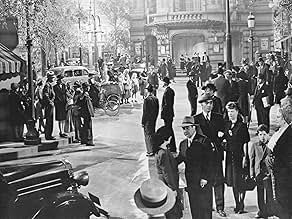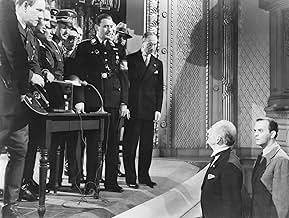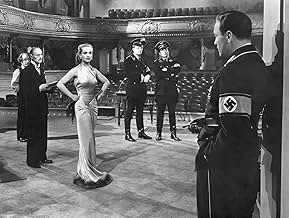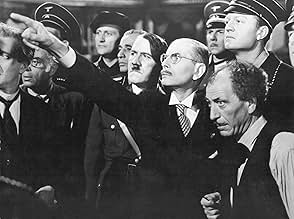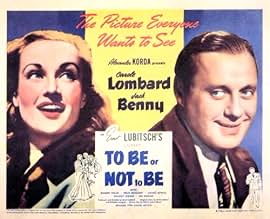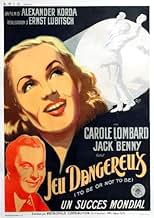Durante l'occupazione nazista della Polonia, una troupe di attori viene coinvolta negli sforzi di un soldato polacco per rintracciare una spia tedesca.Durante l'occupazione nazista della Polonia, una troupe di attori viene coinvolta negli sforzi di un soldato polacco per rintracciare una spia tedesca.Durante l'occupazione nazista della Polonia, una troupe di attori viene coinvolta negli sforzi di un soldato polacco per rintracciare una spia tedesca.
- Regia
- Sceneggiatura
- Star
- Candidato a 1 Oscar
- 5 vittorie e 2 candidature totali
- Gestapo Sergeant at Desk at Top of Hotel Stairs
- (non citato nei titoli originali)
- Polish RAF Pilot
- (non citato nei titoli originali)
- German Soldier
- (non citato nei titoli originali)
- Member of Audience at Performance of Hamlet
- (non citato nei titoli originali)
Riepilogo
Recensioni in evidenza
Lubitsch was, by this time, coming to the end of an exquisite career that defined the nature of sophistication in 'light' cinema. 'To Be or Not To Be' skips lightly over all of the minefield of a subject like this and it is difficult or impossible to think of any other filmmaker who might have managed it (if you look at Mel Brooks' limp remake, you can see why).
In 1996, I presented a massive season of 'the greatest' films in Belfast for the centenary of cinema - 250 titles in 9 months. Of all of them, this was the film which got the greatest ovation - about 5 minutes with a nearly full house standing and applauding! They may have applauded for many reasons, but here are certainly some of them...
The very complicated narrative is presented virtually flawlessly and the comedy is never allowed to hold up the narrative. The principle actors - Carole Lombard (breathtakingly beautiful) and Jack Benny in particular, but many of the supporting cast as well - throw themselves into the affair with a gusto that is completely infectious. Apart from the satirical aspect of the story and the way in which Hitler and the Nazis are mercilessly ridiculed for their authoritarianism and the fear which is their only motivator, the film pokes gentle fun at the vanity of actors in a warm and happy manner. Finally, and most important, is the notion of farce. Farce rarely works in the cinema, but here it does, and in the grand manner - just look at how many times the situation regarding Professor Siletsky changes profoundly during the film - it is dizzying - yet the characters manage to come up with (often self-defeating or inappropriate) schemes on every occasion.
This is a wonderful work that, I have no hesitation in saying, is absolutely vital for anyone who wants to really understand the glory of the cinema. But to answer Dilys Powell's question... yes, the joke is deliriously funny.
Easily the best of the screen versions. The cast is tight and the timing is impeccable. You can really tell that the cast believed in the film. Since America had not taken a formal stance at the time this went into production the producers, cast, and crew were really making something revolutionary and controversial. So much so that the making of this movie was not even mentioned on the Jack Benny radio program. Which is a major deal for those familiar with Old Time Radio, Jack's film career provided excellent material for comedy writers on the radio show, but also the radio show was an excellent opportunity to promote a movie. It is doubtful that this was a missed opportunity, what is more likely is that his sponsor or perhaps the network did not want to advocate a position.
This movie is wonderful for so many reasons. Not only is it hilarious, there is suspense, intrigue, and history. Another poster, mentions the Nazi's jumping out of the plane at the order of a radio transmission by Hitler. The thing to remember here is that the Nazi army was seen as an unstoppable war machine, so efficient, that soldiers would commit suicide if asked. This was less humor than it was to evoke fear of fascism.
Everyone remembers Bob Hope and his travels during WWII, well Jack Benny and Carole Lombard were no slouches either. After all they made this movie. Carole died in a plane crash along with her mother and twenty others returning from a war bond rally before the film was released. Jack went where few if any cameras or radio transmitters could reach. He could be found in the most remote parts of the world entertaining the troops. Not to take anything from Bob, he went there as well, he just had more photo ops.
Bottom line watch this movie--twice, maybe more, the dialogue is so quick and witty there is a good chance you might miss it the first time, them again it is worth at least to looks.
This Hitler, however, turns out to be the actor Bronski (Tom Dugan), a bit-player impersonating the Fuhrer in a play being put on by a Polish theatrical group. Is Hitler "by any chance interested in Mr. Maslowski's delicatessen?" teases the narrator in the opening segment. "That's impossible—he's a vegetarian!" Responding to all the "Heil Hitler" salutes, Bronski asserts "Heil myself" as he walks through an open door. Bronski is playing a secondary role to the famous Polish actor Josef Tura, played by Jack Benny, then a radio star whose trademark straight face and deadpan humor marks the film.
Tura's wife Maria, also a popular Polish actress, is played by Carole Lombard who was to meet a shocking death in a plane crash in January, 1942 shortly after the film was completed. In the film, Maria is two-timing her actor husband by romancing a young flyer Lt. Sobinski (Robert Stack) who falls "head over heels" for the actress. The running gag in the film is that whenever Josef is playing Hamlet and delivers the line, "to be or not to be," it is a signal for Sobinski to get up from his seat in the theater and go backstage to meet Maria in her dressing room. It appears that Tura is more upset about his speech being interrupted than what happens behind the curtain.
The sudden Nazi invasion, however, puts all romantic trysts on the back burner and the mood shifts to solemn. The plot now becomes more involved with espionage and patriotism than acting when Sobinski, now a pilot for the Royal Air Force, discovers that respected Polish professor Siletski (Stanley Ridges) is a double-agent working for the Nazis. When the Lieutenant returns to Warsaw to eliminate the traitorous professor, Maria and Josef team up to help by launching an elaborate charade to trick the unsuspecting Nazis. While the film takes its name from the famous line in Hamlet, Shylock's monologue from the Merchant of Venice, spoken in front of Nazi swastikas, is recited by Jewish actor Felix Bressart, "Have we not eyes? Have we not hands, organs, senses, dimensions, attachments, passions?" he asks the Nazis, "If you poison us, do we not die?"
It is a noteworthy plea for tolerance in the days of rabid anti-Semitism even though the line "Hath not a Jew eyes?" is not spoken. According to Thomas Doherty writing in Tablet magazine, "the word "Jew" was seldom heard on the Hollywood screen, even in war-minded scenarios where the topic of anti-Semitism was front and center." He also quotes film historian Lester D. Friedman saying that "The studio bosses were always—even at this point—afraid of thrusting Jews into the spotlight." Whatever the reason, To Be or Not to Be is marked with the genius of one man, the great Jewish director Ernst Lubitsch who said, "What I have satirized in this picture are the Nazis and their ridiculous ideology," and that the tone and temper of the film "cannot leave any doubt in the spectator's mind what my point of view and attitude are toward these acts of horror."
While the film is a broad and biting satire, from the beginning of production in November 1941 to its completion on December 24th, however, events made sure that To Be or Not to Be, as well as Charles Chaplin's The Great Dictator, was no longer a laughing matter.
Lo sapevi?
- QuizWhen Jack Benny's father went to see this movie, he was outraged at the sight of his son in a Nazi uniform in the first scene and even stormed out of the theater. Jack convinced his father that it was satire, and he agreed to sit through all of it. His father ended up loving the film so much he saw it forty-six times.
- BlooperAlthough having Maria Tura give the cue line "To be or not to be" to the men in the audience she wishes to meet in her dressing room is a very funny premise of the film, it actually would be highly impractical for Maria to think she would have time to meet backstage. Hamlet's "To be or not to be" soliloquy is only about 3-4 minutes long and Ophelia has the very next line in the play (in fact Hamlet announces her entrance at the end of his soliloquy), which would barely give Maria any time to meet men in her dressing room.
- Citazioni
Joseph Tura: [disguised as Professor Siletsky - speaking about Maria Tura] Her husband is that great, great Polish actor, Josef Tura. You've probably heard of him.
Colonel Ehrhardt: Oh, yes. As a matter of fact I saw him on the stage when I was in Warsaw once before the war.
Joseph Tura: Really?
Colonel Ehrhardt: What he did to Shakespeare we are now doing to Poland.
- Versioni alternativeIn Poland, a brief introduction was edited in. Polish actor Kazimierz Rudzki assured the audience that the movie was done with best intentions by their "American friends". At the time the movie screened in Poland, many people still lived in trauma from the events of World War II; few could find comedy in the German invasion of Poland, instead finding the movie in poor taste, offensive, or hard to swallow.
- ConnessioniFeatured in Showbiz Goes to War (1982)
- Colonne sonorePolonaise in A major, Op. 40, No. 1, 'Military'
(1838) (uncredited)
Written by Frédéric Chopin
Orchestral arrangement by Aleksandr Glazunov
Heard during the opening and closing credits
I più visti
- How long is To Be or Not to Be?Powered by Alexa
Dettagli
Botteghino
- Lordo Stati Uniti e Canada
- 3.270.000 USD
- Lordo in tutto il mondo
- 4.578.000 USD
- Tempo di esecuzione1 ora 39 minuti
- Colore
- Proporzioni
- 1.37 : 1
Contribuisci a questa pagina


